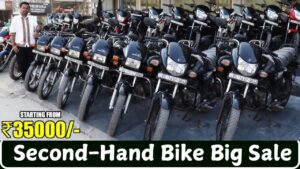Second-Hand Bike
Buying a second-hand bike is an excellent way to save money while gaining access to a wide variety of models. However, it requires careful consideration to ensure you get a reliable and safe vehicle. This summary outlines the main aspects of purchasing a second-hand bike, including benefits, places to buy, important checks, price negotiation, legal documentation, and safety precautions.

Why Buy a Second-Hand Bike?
The biggest advantage of buying a second-hand bike is affordability. Pre-owned bikes are much cheaper than new ones, offering a cost-effective way to own a vehicle. Another benefit is the variety available in the second-hand market, which includes everything from commuter bikes to high-performance models. Additionally, second-hand bikes often come with lower insurance premiums, further reducing ownership costs. Since many popular models have been in circulation for years, spare parts are generally easy to find and cheaper, making maintenance more affordable.
From an environmental perspective, purchasing a second-hand bike supports sustainability by reusing vehicles rather than contributing to the demand for new manufacturing. This eco-friendly aspect is increasingly important for environmentally-conscious buyers.
Where to Buy a Second-Hand Bike
There are several reliable sources for purchasing second-hand bikes. Online marketplaces like OLX, Quikr, and Facebook Marketplace offer a vast selection, but buyers must be cautious about scams and fraud. Authorized dealerships also sell second-hand bikes, often with warranties and after-sales support, though these may come at slightly higher prices. Local classified ads, auction houses, and bike shops are other viable options. Each of these platforms has its pros and cons, but all require careful inspection and negotiation.
What to Look for in a Second-Hand Bike
When purchasing a second-hand bike, thoroughly inspecting its condition is crucial. The engine, frame, tires, brakes, suspension, and chain should be checked for any signs of wear or damage. Bikes with issues in these areas may need costly repairs in the future. Additionally, checking the bike’s mileage gives an indication of how much it has been used. Bikes that have covered a high distance may be more prone to wear and tear, while bikes with unusually low mileage could have hidden problems.
Equally important is ensuring that the bike comes with all necessary paperwork, including the registration certificate (RC), insurance papers, and Pollution Under Control (PUC) certificate. Without these documents, transferring ownership or legally riding the bike could become problematic. It’s also advisable to ask for the bike’s service records, as a well-maintained bike is more likely to be in good condition.
Negotiating the Price
When it comes to negotiating the price, preparation is key. Researching the market value of the bike model you’re interested in will give you a benchmark for a fair price. If the bike has visible defects or needs repairs, use these issues as leverage to lower the price. Be clear about your budget and stick to it, and factor in potential repair or insurance costs when negotiating the final amount.
Legal Documentation and Transfer of Ownership
After agreeing on the price, the next step is transferring ownership. This involves submitting the necessary forms to the Regional Transport Office (RTO), along with the registration certificate and proof of sale. Ensuring the transfer of insurance is equally important, as riding without valid insurance can lead to legal consequences. Additionally, the bike should have a valid Pollution Under Control (PUC) certificate to comply with regulations.
Precautions and Safety Tips
When buying a second-hand bike, it’s essential to take precautions to avoid scams. Always meet sellers in public places and avoid making payments before seeing the bike in person. Consider bringing a friend for safety, and if possible, consult a mechanic to assess the bike’s condition. A professional opinion can help you avoid future repair costs or potential risks.
Conclusion
Buying a second-hand bike can be a cost-effective and environmentally friendly option, but it requires careful planning and research. By thoroughly inspecting the bike, ensuring all legal documentation is in place, and negotiating wisely, you can make an informed purchase that suits your budget and needs.
